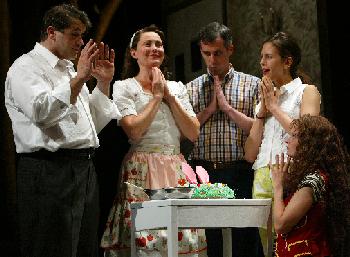SEARCH CurtainUp
REVIEWS
FEATURES
NEWS
Etcetera and
Short Term Listings
LISTINGS
Broadway
Off-Broadway
BOOKS and CDs
OTHER PLACES
Berkshires
London
LA/San Diego
Philadelphia
Elsewhere
QUOTES
On TKTS
LETTERS TO EDITOR
FILM
LINKS
MISCELLANEOUS
Free Updates
Masthead
NYC Weather
Flesh and Blood
by Les Gutman
|
I can love this. I can try and love this. There's nothing else for me to do. For this is what the living do. Here are the years to come. One hour and then another and another and another and another. ---Mary |

J. Sierros, C. Jones, P. Gaitens, J. Hecht and M. Plimpton
(Photo: Joan Marcus) |
Ambitious is the first word that comes to mind in describing New York Theatre Workshop's tackling of Michael Cunningham's Flesh and Blood. It's a book of considerable length, and epic proportions, that tells a century of a family's story. The threshold question: how well can a book of such dimension be transformed into a stage play. The short answer here: about as well as one might have expected, but not as well as one might have hoped.
Cunningham's bestselling The Hours was a book that told three separate but eventually interconnected stories. It seemed an unlikely candidate for a great film, but with a brilliant screenplay by David Hare and smart direction from Stephen Daldry, it transcended its potential limitations. Flesh and Blood presents different challenges, calling for a magical solution that neither playwright-adapter Peter Gaitens nor director Doug Hughes found. In the end, it seems more like a pageant than a play, and though it is well-staged and finely acted, it only sketches the outline of the book.
The story begins with the young Constantine Stassos (John Sierros) in Greece in 1935. He will come to New Jersey, wed Mary (Cherry Jones) and become successful in the construction business. They will have three children: Susan (Jessica Hecht), who is haunted by her improper relationship with her father and her mother's failings, becoming a housewife to a successful lawyer (Chris McGarry) and bearing a preppy son, Ben (Sean Dugan); Billy, later called Will (Gaitens), who is gay and at odds with his father from a young age, eventually entering a long-term relationship with Harry (Peter Frechette); and Zoe (Martha Plimpton), a rebellious daughter who nonetheless has a special bond with her father, escapes suburbia for New York City, where she meets a wise old drag queen named Cassandra (Joel Weiss), has a son, Jamal (Airrion Doss), with a black man who disappears and, after years as a junkie, dies of AIDS. Constantine and Mary will divorce; he will remarry Magda (Patricia Buckley). In the show's fast-forwarded final scene, we find Jamal, with his own daughter (Plimpton), about to spread Will's ashes in the bay.
Gaitens has added a prologue which frames the play with Cunningham's final scene. Too artsy for my taste, it underscores a theme of generational "voices" that essentially substitutes (not to great effect) for Cunningham's carefully wrought underpinnings of this family's fractures. Ironically, Gaitens is most successful at weaving the nuances of the principal non-family member, Cassandra, into the story.
Gaitens is judicious in his editing of the action, though he loses much of the connective tissue along the way. The performances go as far as they can in making up the difference. The wonderful Cherry Jones captures Mary's fragile personality throughout, and Joel Weiss's Cassandra is spectacular, revealing a rare and keen humanity. Sierros is thoroughly credible as the domineering Constantine whose cultural challenges do not end when he masters the English language. All three siblings are well-presented, though the difficulty of having adults portraying children makes many of the early scenes a stretch. (Sean Dugan has a greater ease in doing so as Ben.) Much doubling is asked of the remainder of the cast (Frechette, Buckley and McGarry), and they deliver with aplomb.
Hughes is to be commended not only for assembling a stellar cast, but for involving an excellent design team. Christine Jones's set is very effective and flexible, and carefully lit by Scott Zielinski. Paul Tazewell's costumes are outstanding in capturing the show's periods and personalities.
Cunningham's playbill bio reports that another of his books, A Home at the End of the World has a film version in production. (Interestingly, like The Hours, with theater people guiding it: Keith Bunin wrote the screen play and Michael Mayer directs.) Who knows? Maybe someday Flesh and Blood can overcome some of its obstacles on the silver screen as well.
|
Flesh and Blood by Peter Gaitens, adapted from the novel by Michael Cunningham Directed by Doug Hughes with Patricia Buckley, Airrion Doss, Sean Dugan, Peter Frechette, Peter Gaitens, Jessica Hecht, Cherry Jones, Chris McGarry, Martha Plimpton, John Sierros and Jeff Weiss Set Design: Christine Jones Costume Design: Paul Tazewell Lighting Design: Scott Zielinski Sound Design: David Van Tieghem Running time: 3 hours, 15 minutes with 1 intermission New York Theatre Workshop, 79 East 4th Street (Bowery/2 AV) Telephone: (212) 239-6200 TUES - SAT @8, SAT - SUN @2, SUN @7; $60 ($20 SUN evenings, at box office only) Opening July 16, 2003, closing August 24, 2003 Reviewed by Les Gutman based on 7/13/03 performance |

Mendes at the Donmar
Our Review

At This Theater

Leonard Maltin's 2003 Movie and Video Guide

Ridiculous!The Theatrical Life & Times of Charles Ludlam

Somewhere For Me, a Biography of Richard Rodgers

The New York Times Book of Broadway: On the Aisle for the Unforgettable Plays of the Last Century

6, 500 Comparative Phrases including 800 Shakespearean Metaphors by CurtainUp's editor.
Click image to buy.
Go here for details and larger image.




